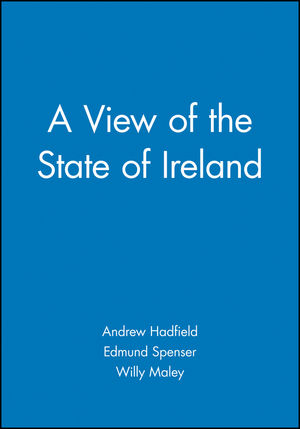|
Textbook
A View of the State of IrelandISBN: 978-0-631-20535-7
Paperback
228 pages
October 1997, ©1997, Wiley-Blackwell
 This is a Print-on-Demand title. It will be printed specifically to fill your order. Please allow an additional 10-15 days delivery time. The book is not returnable.
|
||||||
"This timely edition of Spenser's infamous prose treatise about
Ireland... which .includes a judicious introductory essay outlining
the current state of critical debate about Spenser, a chronology of
his life, a glossary, and an annotated bibliography, goes a long
way towards redressing ill-informed suppositions about this
sixteenth-century dialogue. The edition has the further virtue that
it does not overwhelm the text with commentary or annotation. This
deft, informative and user-friendly edition of A View of the
State of Ireland persuasively urges us not just to read
Spenser's text in the first instance but to give full consideration
to the historical and political contexts and epistemological
frameworks within which readings of this highly problematical but
central colonial treatise are constructed." Irish University
Review, Spring/Summer
"The appearance of a new paperback edition of Ware's version of the
Vewe, carefully prepared for a non-specialist audience by
Andrew Hadfield and Willy Maley, is bound to raise the temperature
of this debate. Mindful that other scholars might complain that
Ware's text is corrupt, Hadfield and Maley have overcome this
problem by including an appendix of those passages that were
omitted from Spenser's text by Ware. This is arguably the most
important part of their attractive and accessible little book, and
it should guarantee that their edition will become a standard
reference for academics as well as general readers.
Ireland
"The introduction as a whole is a model of clarity, balance and compression which will admirably fulfil the editors aim of bringing Spenser's View to a far wider readership and they have provided also a critical guide to further reading which, both in its comprehensiveness and its detachment from the scholastic wranglings that have so often disfigured Spenser commentary, is exemplary." Irish Studies Review



